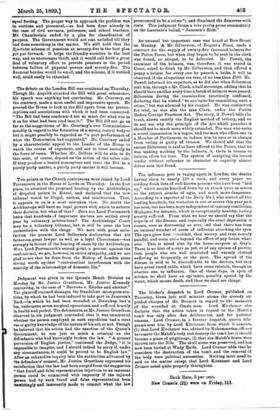An unusual but important case was heard at Bow Street
on Monday. A. Mr. Silberston, of Regent's Place, made a contract for the supply of twenty-five thousand helmets for the Police Force, but when they began to be sent in the cloth was found, or alleged, to be defective. Mr. Powell, the examiner of the helmets, was, therefore, it was stated in Court, asked to drink by Mr. Silberston, and then offered a penny a helmet for every one he passed, a bribe, it will be observed, if the allegations are true, of no less than £100. Mr. Powell informed his superiors, as he did also when Silberston sent him, through a Mr. Clark, a half-sovereign, adding that he should have another every time a batch of helmets were passed. Silberston daring the examination practically confessed, declaring that he wished " to apologise for committing such a crime," but was silenced by his counsel. He was committed for trial, as was also the man Clark, under the Public Bodies Corrupt Practices Act. The story, if Powell tells the truth, shows exactly the English method of bribery, and we do not see why the principle of the Act which punishes it should not be much more widely extended. The man who seeks a secret commission is a rogue, and the man who offers one to a Member of Parliament to induce him to vote or to abstain from voting is guilty of treason. We should add that the excuse Silberston is said to have offered to the Police, that he was making nothing by the helmets, is, there is reason to believe, often too true. The system of accepting the lowest tender without reference to character or capacity almost drives men into fraud.






































 Previous page
Previous page